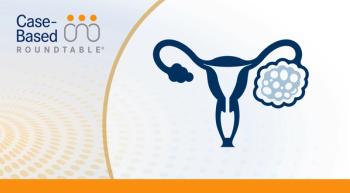
Recurrent Endometrial Cancer: An Evolving Treatment Landscape
Closing out her discussion on the management of recurrent endometrial cancer, Ritu Salani, MD, MBA, shares clinical pearls amidst the shifting treatment paradigm.
Episodes in this series

Case 1:A 64-Year-Old Woman With Recurrence of Endometrial Cancer
August 2021
Initial Presentation
- A 64-year-old postmenopausal woman presented with abnormal uterine bleeding lasting 4 months
Patient History, Lifestyle and Clinical workup
- She notes that she underwent menopause at 55 years of age
- She is a widow, has no children, and lives alone
- PMH: arthritis, obesity (BMI=40), hypertension well controlled with medication
- ECOG PS=1
Initial Diagnosis and Treatment
- Endometrial biopsy results:
- Endometrioid adenocarcinoma
- Stage IA, Grade 1
- IHC/Molecular testing results:
- Mismatch repair deficiency (dMMR)
- MSI-H
- 3+ ER-positive
- The patient is counseled on surgical options and scheduled for surgery.
July 2022
Presentation at Recurrence
- Patient reports chronic pelvic pain over 4 weeks
Diagnosis of Recurrence
- CAP CT suggests relapsed/metastatic disease with involvement of 1 right external iliac lymph node
Treatment for Recurrence
- Carboplatin/paclitaxel (6x Q3W cycles) was administered.
- Chemotherapy was well tolerated, and a complete response was recorded at end of regimen.
February 2023
Diagnosis of Recurrence
- Disease relapse is documented on routine follow up.
- CT CAP shows heterogeneously enhancing mass in right suprarenal space, multiple bilateral pulmonary nodules, and a new right internal iliac lymph node (in addition to the previously observed positive lymph node)
- Fine needle aspirate of the suprarenal mass confirmed metastatic endometroid adenocarcinoma.
- The patient was counseled about systemic therapy options, during which she repeatedly expressed concerns about side effects.
- Dostarlimab was initiated with partial response noted on CT imaging 4 months after initiation
Transcript:
Ritu Salani, MD, MBA: Recently, we saw the results of the RUBY trial and [NRG-GY018] trial, which looked at the addition of checkpoint inhibitors to chemotherapy. These were both published in The New England Journal of Medicine. These trials really changed the landscape for endometrial cancer. In the deficient mismatch repair population, the use of immunotherapy or checkpoint inhibitors in the front line—dostarlimab or pembrolizumab—is going to become the standard of care. Now this creates a new unmet need in second-line therapy. So in our case today of this patient who had deficient mismatch repair protein, she would receive checkpoint inhibitors, with chemotherapy at the time of her initial disease recurrence at the time of her first-line therapy. Then on the second line, it becomes a challenge of, “What therapy do we offer this patient?” If there’s a long interval between her first line and her recurrence, then the option of repeating checkpoint inhibitors may become an option, but we don’t have [those] data yet and so this becomes a new unmet need of what to offer these patients. Are we back to standard therapy? This also may disrupt lenvatinib and pembrolizumab even in the mismatch repair proficient group where we saw some benefits in progression-free survival, although [these] data [are] still being evaluated. I think this creates a new, good problem that we have to find better therapies for that second-line space, particularly for mismatch repair deficient groups.
So key takeaways, I think, in regards to endometrial cancer are that we are familiar with the use of checkpoint inhibitors in not just endometrial cancer but other cancers, and combining it with chemotherapy has been shown to be done safely and effectively. I think that because this landscape is evolving so rapidly, it is so important to stay on top of [these] data, as we’re seeing new regimens or new therapies being developed and sometimes disrupting what we do in the next lines of therapy. Understanding what clinical trials are out there or what other options we have to offer those patients is going to be really critical. But staying up-to-date by using resources that provide education is going to be really key because this landscape is shifting below our feet faster than we can keep up.
Transcript edited for clarity.




















